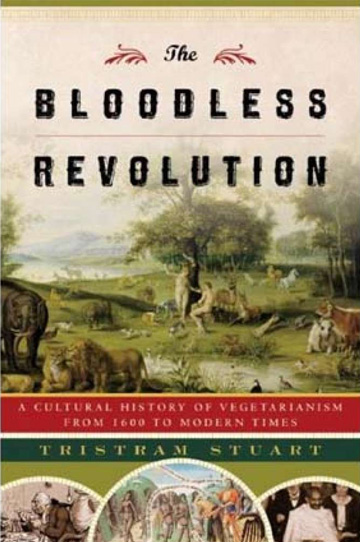
Meat Eaters, Chew on This
January 7, 2007 | San Francisco Chronicle
An intellectual history of a food choice shows its ties to political and social radicals, Eastern religious thought and the odd health nut.
In “Animal Liberation,” the bible of the modern animal rights movement, philosopher Peter Singer bluntly claims that “[t]he attitudes toward animals of previous generations are no longer convincing because they draw on presuppositions — religious, moral, metaphysical — that are now obsolete.” Singer was referring to earlier rationales for eating meat, but the claim also implicitly dismisses the history of vegetarianism, which is fascinating and telling. Did you know, for instance, that many 17th century Britons abstained from meat in order to feel closer to Eden, where fruits and vegetables provided sustenance, and Adam and Eve interacted peacefully with animals?
Tristram Stuart, a precocious young British writer, has no doubt read “Animal Liberation.” In fact, judging from his 65-page bibliography, he appears to have read just about every word ever written about vegetarianism. His book, “The Bloodless Revolution” (a pun from an alternative name for the Glorious Revolution of 1688) is an intellectual history of vegetarianism in 17th and 18th century Europe, with nods to the years since. It is a beautifully written work of impressive scholarship, perhaps the most erudite yet to appear on the subject of vegetarian history. Previous authors have sketched major vegetarian thinkers, but Stuart goes further, interacting extensively with primary-source materials, thoughtfully challenging the conclusions of other scholars and bolstering his own credibility by outing a few closet meat eaters, such as Alexander Pope.
It is worth noting that Stuart is not a vegetarian. As he has written elsewhere, he opposes the ecological impact of the factory farm, rather than meat itself, which he eats when he can be satisfied that the animals were reared and killed sensitively. (He does both himself.) But given the intensive animal farming methods ubiquitous today, he acknowledges that the best choice is probably to become a vegetarian. Regardless, Stuart wears his beliefs lightly, avoiding the moralism that has given the Western world an easy excuse to ignore the persuasive case for vegetarianism for, apparently, centuries.
The rejection of meat has frequently been accompanied by political and social radicalism. Reformers such as Roger Crab in the 17th century and John Oswald in the 18th saw meat as a symbol of unjust luxury and renounced it in solidarity with the poor. Foes of the Catholic Church courted heresy by abjuring food from animals and extending their moral concern beyond the one anointed species. In the years after the French Revolution, students (many of them vegetarians) made their way across the English Channel in search of other barricades to storm; in response, the Crown resisted animal welfare laws as a form of “patriotic opposition to the onion-eating French and their radical allies in Britain.”
Religious belief also provided impetus for vegetarianism. Sir Francis Bacon, while not a vegetarian himself, scandalously interpreted Genesis’ prescription for man’s dominion over animals as a call for compassionate stewardship rather than callous exploitation. (This argument was resuscitated in 2002 in a remarkable and moving book, “Dominion,” by Matthew Scully, a former speechwriter to President Bush.) As Europeans traveled East, many became infatuated with Indian religion and culture; vegetarianism, they saw, was widely accepted and yielded an ethical and healthy lifestyle. One Portuguese visitor was “astounded by the ‘marvelous’ extreme to which the Indians took ‘this law of not killing anything.’ ”
The most enduring basis for vegetarianism — animal welfare — did not begin to take hold until philosophers Jean-Jacques Rousseau and Jeremy Bentham, both meat eaters, separately challenged the prevailing rationale for eating animals. “[T]he question is not, Can they reason? nor, Can they talk?” wrote Bentham in 1789, “but, Can they suffer?” This was a response to the argument a century before by René Descartes, a vegetarian for health reasons, that animals are inanimate objects — “machines” — that feel no pain because they do not have souls. Cruel experiments proliferated on the back of this preposterous theory for decades. (Singer calls this moment the “absolute nadir” of modern thought toward animals.) Human health has also influenced vegetarians, and Stuart points out that if worries about meat’s noxious humors and insalubrious fibers sound quaint today, they nevertheless prefigured modern discoveries about the relationship between meat and the scourge of heart disease.
Vegetarian thought certainly has had its share of characters, and in less able hands this history might come off as a series of maladjusted kooks whose radical ideas needn’t be taken seriously. But the picture that emerges from “The Bloodless Revolution” is a group of individuals troubled enough to take action against a practice — the killing and eating of animals — that unquestionably has profound moral implications. In an age in which a staggering 50 billion farm animals each year are reared in appalling conditions, slaughtered for our food and thoughtlessly consumed, any book that sets out an alternative is welcome. An excellent book that does so is indispensable.